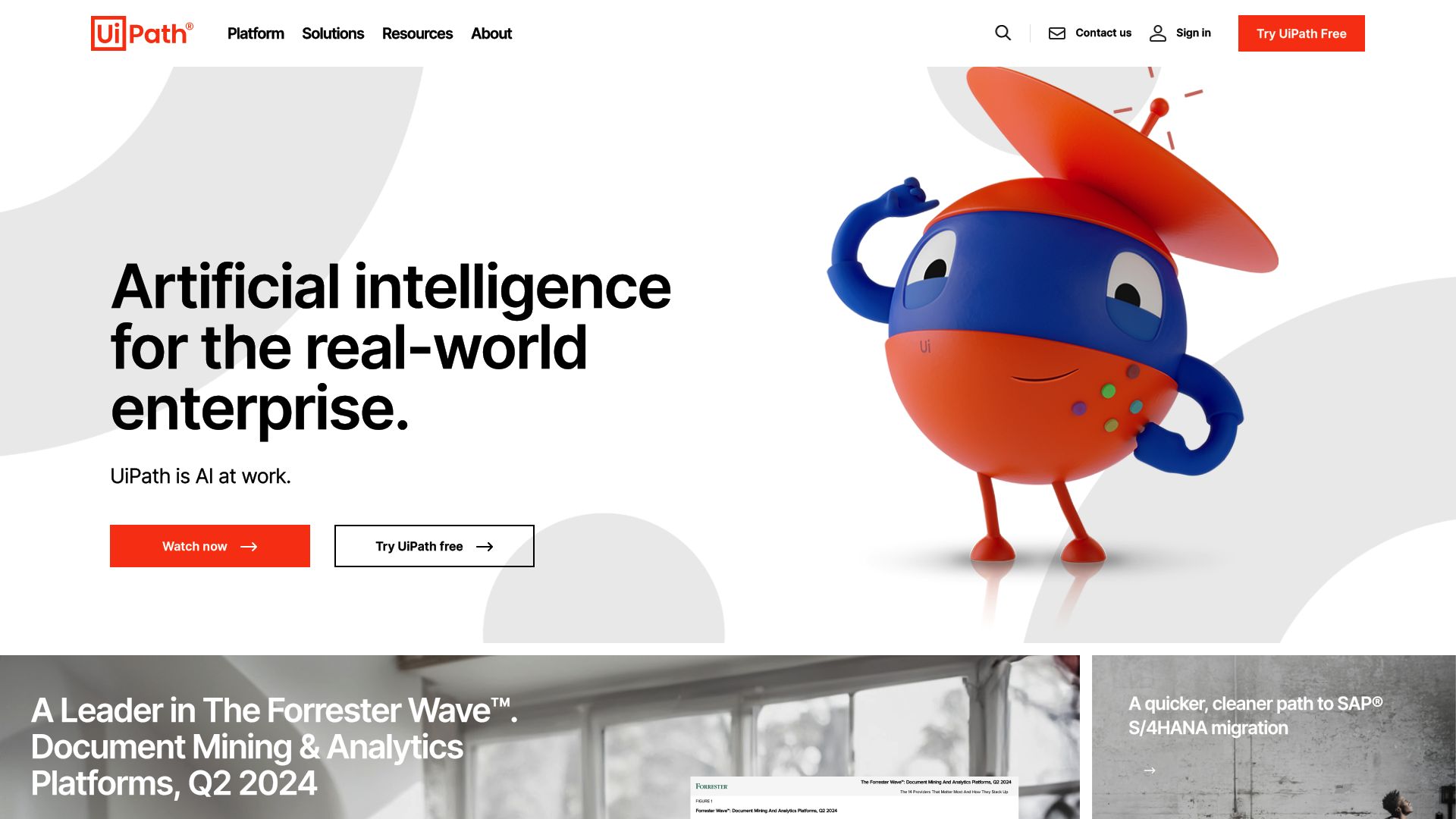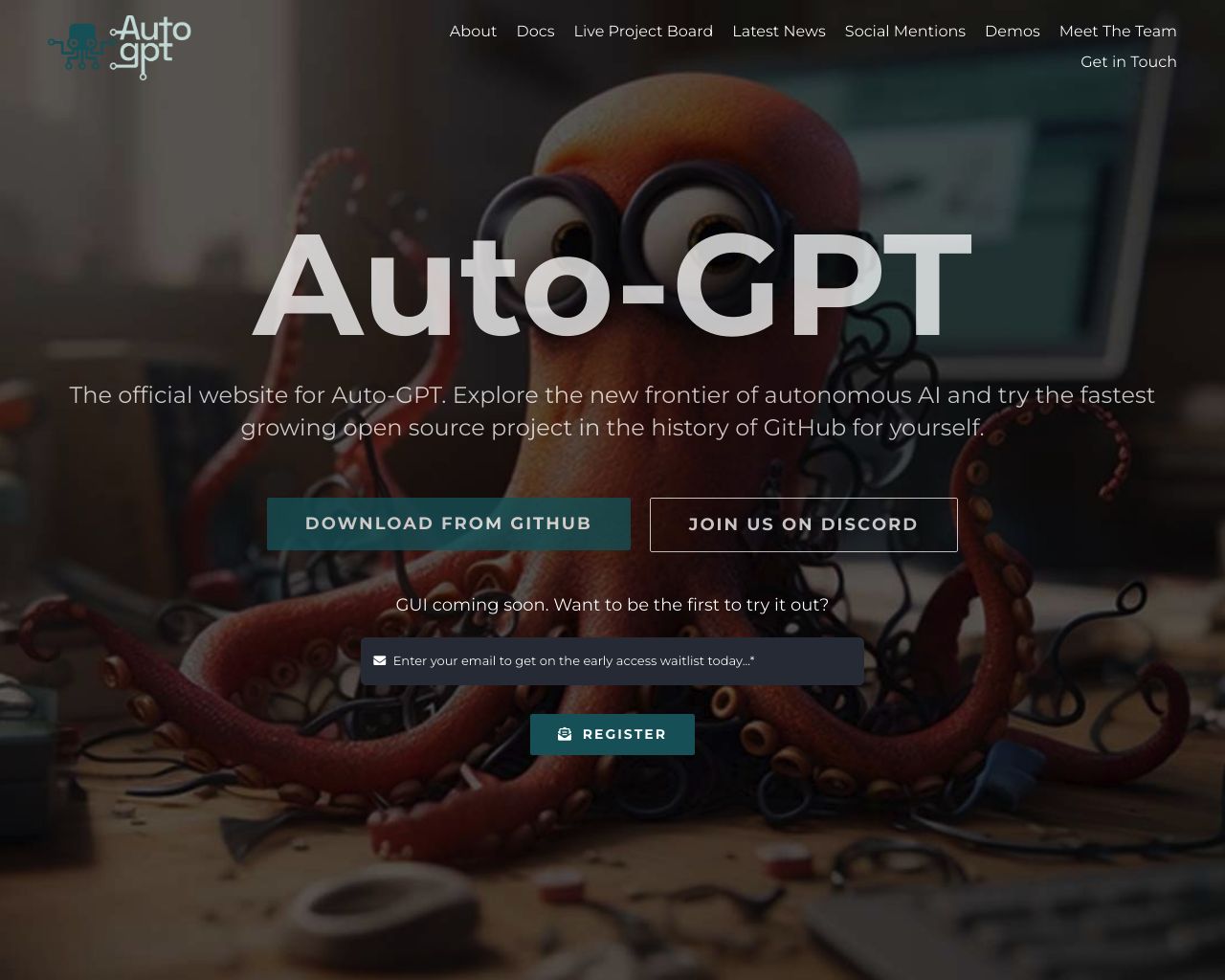UiPath vs. AutoGPT: Comparing AI Automation Titans
AI agents and automation platforms are transforming how businesses operate, innovate, and compete. UiPath, a leader in robotic process automation, AutoGPT, an open-source autonomous agent project, and SmythOS, our cutting-edge AI development platform, each offer unique approaches to harnessing AI’s power.
This comparison explores their key features, strengths, and limitations, helping you navigate the rapidly evolving landscape of AI tools. Whether you’re a developer seeking powerful APIs, a business leader focused on enterprise-grade solutions, or an entrepreneur looking for accessible AI capabilities, understanding these platforms is crucial for making informed decisions about integrating AI into your operations.
UiPath Overview
UiPath transforms businesses through intelligent automation. The platform empowers organizations to streamline operations, boost productivity, and enhance customer experiences. UiPath’s Robotic Process Automation (RPA) technology automates repetitive tasks, freeing employees to focus on higher-value work.
UiPath Studio, the company’s flagship product, enables users to build complex automation workflows through an intuitive visual interface. This tool caters to both seasoned developers and business users with limited coding experience. UiPath Studio combines drag-and-drop functionality with advanced scripting capabilities, allowing for the creation of sophisticated automation solutions.
UiPath Studio enables users to build complex automation workflows through an intuitive visual interface… catering to both seasoned developers and business users with limited coding experience.


The platform excels in enterprise-grade features, offering robust security measures, scalability, and seamless integration with existing systems. UiPath Orchestrator provides centralized management for deploying and monitoring automation at scale. This centralized control ensures efficient resource allocation and maintains governance across large-scale deployments.
While UiPath offers powerful automation capabilities, it requires a significant investment in training and resources to fully leverage its potential. The learning curve can be steep for organizations new to RPA. Additionally, UiPath’s pricing model may pose challenges for smaller businesses or those with limited budgets.
UiPath integrates with a wide range of applications and technologies, enhancing its versatility. The platform supports connections to popular enterprise systems, databases, and cloud services. This integration capability allows organizations to create end-to-end automation solutions that span multiple departments and processes.
UiPath integrates with a wide range of applications and technologies… allowing organizations to create end-to-end automation solutions that span multiple departments and processes.
AutoGPT Overview
AutoGPT revolutionizes AI development by enabling the creation of autonomous agents capable of complex problem-solving without constant human input. This open-source project, developed by Toran Bruce Richards and released by Significant Gravitas Ltd., harnesses OpenAI’s GPT-4 to break down tasks, maintain context, and leverage internet resources to achieve predefined goals.
Unlike traditional AI models, AutoGPT excels in self-prompting and managing long-term tasks independently. It automates workflows by dissecting large projects into manageable sub-tasks, preserving short-term memory for context, and retrieving up-to-date information. This versatility makes AutoGPT suitable for diverse applications, from software development and business operations to market research and content creation.
AutoGPT revolutionizes AI development by enabling the creation of autonomous agents capable of complex problem-solving without constant human input.


AutoGPT stands out with its ability to debug and enhance its own code, manage files for improved data structure, and process both text and image inputs. The platform has spawned various specialized AI agents, such as ChefGPT for unique recipe generation, showcasing its adaptability to different domains.
Despite its advanced capabilities, AutoGPT faces challenges. It can be prone to errors from self-feedback, hallucinations, and high operational costs due to its recursive nature. The platform may encounter infinite loops and lacks long-term memory, which can impact its overall performance in extended tasks.
AutoGPT stands out with its ability to debug and enhance its own code, manage files for improved data structure, and process both text and image inputs.
AutoGPT’s vision aligns with the pursuit of artificial general intelligence (AGI), aiming to create AI capable of human-level intellectual tasks. Its unique selling point lies in autonomous decision-making and task execution, distinguishing it from models like ChatGPT that require continuous human prompts. As a milestone in AI development, AutoGPT offers a glimpse into the future of autonomous AI agents, attracting significant attention from the tech community and investors alike.
Feature Comparison
UiPath and AutoGPT offer distinct approaches to automation and AI agent development. UiPath excels in robotic process automation (RPA) with enterprise-grade features, while AutoGPT focuses on creating autonomous AI agents capable of complex problem-solving.
UiPath provides robust tools for building and managing automation workflows, including a visual drag-and-drop interface in UiPath Studio. It supports both attended and unattended automation, allowing for human-in-the-loop processes and fully automated tasks. UiPath’s strength lies in its ability to integrate with existing enterprise systems and orchestrate large-scale automation deployments through UiPath Orchestrator.
AutoGPT, conversely, emphasizes autonomous agent creation powered by advanced language models. It excels in self-prompting and managing long-term tasks without constant human input. AutoGPT’s agents can break down complex goals into subtasks, maintain context, and leverage internet resources to complete objectives. This makes AutoGPT particularly suited for open-ended problem-solving and tasks requiring adaptive reasoning.
In terms of security and core components, UiPath offers enterprise-level features like robust encryption, access controls, and detailed audit logs. It provides extensive integration capabilities with existing systems and APIs. AutoGPT, being more experimental, may lack some of these enterprise-grade security features and established integration frameworks. However, it compensates with its ability to autonomously interact with various online services and APIs to accomplish tasks.
Feature Comparison Table
| UiPath | AutoGPT | SmythOS | |
|---|---|---|---|
| CORE FEATURES | |||
| AI Agents | ❌ | ✅ | ✅ |
| Hosted Agents (Dev, Production) | ❌ | ❌ | ✅ |
| No-Code Options | ❌ | ✅ | ✅ |
| Memory & Context | ❌ | ✅ | ✅ |
| Autonomous Agents | ❌ | ✅ | ✅ |
| Explainability & Transparency | ❌ | ❌ | ✅ |
| Multimodal | ❌ | ✅ | ✅ |
| Problem-Solving Capabilities | ❌ | ✅ | ✅ |
| Multi-Agent Collaboration | ❌ | ✅ | ✅ |
| Audit Logs for Analytics | ✅ | ❌ | ✅ |
| Work as Team | ❌ | ✅ | ✅ |
| Agent Work Scheduler | ✅ | ❌ | ✅ |
| SECURITY | |||
| Constrained Alignment | ❌ | ❌ | ✅ |
| IP Control | ✅ | ❌ | ✅ |
| COMPONENTS | |||
| Foundation AIs | ❌ | ✅ | ✅ |
| Huggingface AIs | ❌ | ✅ | ✅ |
| Zapier APIs | ❌ | ✅ | ✅ |
| Classifiers | ❌ | ✅ | ✅ |
| Data Lakes | ❌ | ❌ | ✅ |
| DEPLOYMENT OPTIONS (EMBODIMENTS) | |||
| Deploy as API | ❌ | ✅ | ✅ |
| Deploy as Webhook | ❌ | ✅ | ✅ |
| Staging Domains | ❌ | ❌ | ✅ |
| Production Domains | ❌ | ❌ | ✅ |
| Deploy as Site Chat | ❌ | ✅ | ✅ |
| Deploy as Scheduled Agent | ❌ | ❌ | ✅ |
| Deploy as GPT | ❌ | ✅ | ✅ |
| DATA LAKE SUPPORT | |||
| Hosted Vector Database | ❌ | ❌ | ✅ |
| Sitemap Crawler | ❌ | ❌ | ✅ |
| YouTube Transcript Crawler | ❌ | ❌ | ✅ |
| URL Crawler | ❌ | ✅ | ✅ |
| TXT File Support | ❌ | ✅ | ✅ |
Best Alternative to UiPath and AutoGPT
SmythOS emerges as the superior alternative to UiPath and AutoGPT, offering a comprehensive AI agent development platform that combines the best of both worlds. We provide a versatile solution that empowers users to create, deploy, and manage intelligent agents with unprecedented ease and flexibility.
Our drag-and-drop interface simplifies the creation of complex AI workflows, making advanced AI functionalities accessible to users of all skill levels. Unlike UiPath’s focus on robotic process automation or AutoGPT’s emphasis on autonomous problem-solving, SmythOS delivers a holistic approach to AI agent development that caters to a wide range of use cases.
SmythOS delivers a holistic approach to AI agent development that caters to a wide range of use cases.
SmythOS stands out with its extensive integration ecosystem, supporting various AI models, APIs, and tools. This flexibility allows seamless incorporation into existing workflows and business processes, addressing a key limitation of both UiPath and AutoGPT. Our platform’s ability to deploy agents across multiple environments, including as APIs, webhooks, and chatbots, provides unmatched versatility in how AI solutions can be implemented.
Security and scalability set SmythOS apart from its competitors. We offer robust features like data encryption, OAuth support, and IP control, ensuring enterprise-grade security that UiPath provides but AutoGPT lacks. Additionally, our platform’s scalability allows for efficient handling of growing demands, a critical factor for businesses looking to expand their AI capabilities.
By choosing SmythOS, users gain access to a powerful, user-friendly platform that combines the strengths of UiPath and AutoGPT while addressing their limitations. Our solution empowers businesses to harness the full potential of AI, driving innovation and efficiency across various industries with unparalleled ease and effectiveness.
Conclusion
UiPath, AutoGPT, and SmythOS each offer unique approaches to automation and AI agent development. UiPath excels in enterprise-grade robotic process automation, providing powerful tools for building and managing workflows. AutoGPT pushes the boundaries of autonomous AI agents, capable of complex problem-solving without constant human input. However, SmythOS emerges as the superior choice, combining the best of both worlds with additional innovative features.
SmythOS stands out with its intuitive drag-and-drop interface, extensive integration ecosystem, and versatile deployment options. Unlike UiPath’s steep learning curve or AutoGPT’s experimental nature, SmythOS offers a balance of power and accessibility. It supports multi-agent orchestration, allows for deployment across various platforms, and provides pre-built API integrations and templates, significantly reducing setup time and complexity.
While UiPath and AutoGPT have their strengths in specific scenarios, SmythOS’s comprehensive feature set and user-friendly approach make it the ideal solution for businesses looking to harness AI’s full potential. Its ability to create once and deploy anywhere, coupled with support for multiple AI models and data sources, positions SmythOS as a versatile and future-proof platform for AI agent development.
We invite you to experience the power of SmythOS firsthand. Create a free SmythOS account today and start building AI agents that can transform your business processes. With our 30-day money-back guarantee and unlimited agent creation, you can explore the future of AI automation risk-free. Discover our extensive library of AI agent templates to jumpstart your journey into the world of intelligent automation.
Last updated:
Disclaimer: The information presented in this article is for general informational purposes only and is provided as is. While we strive to keep the content up-to-date and accurate, we make no representations or warranties of any kind, express or implied, about the completeness, accuracy, reliability, suitability, or availability of the information contained in this article.
Any reliance you place on such information is strictly at your own risk. We reserve the right to make additions, deletions, or modifications to the contents of this article at any time without prior notice.
In no event will we be liable for any loss or damage including without limitation, indirect or consequential loss or damage, or any loss or damage whatsoever arising from loss of data, profits, or any other loss not specified herein arising out of, or in connection with, the use of this article.
Despite our best efforts, this article may contain oversights, errors, or omissions. If you notice any inaccuracies or have concerns about the content, please report them through our content feedback form. Your input helps us maintain the quality and reliability of our information.
